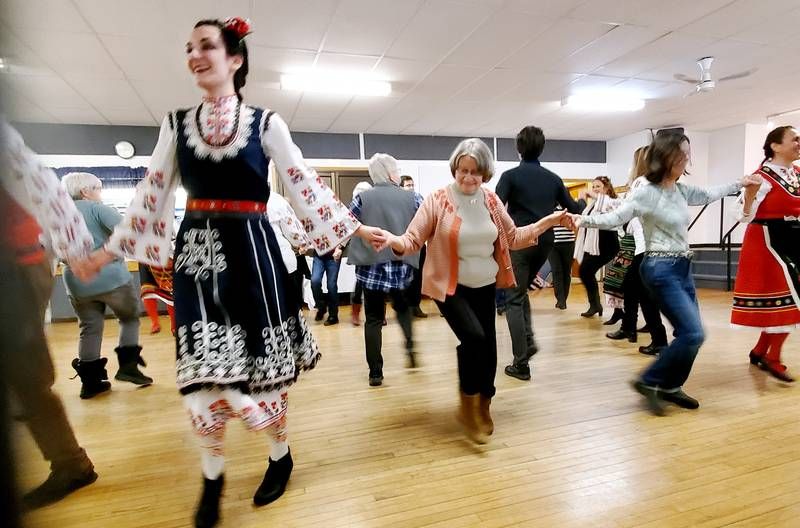Jeff Green | Feb 01, 2023
It was fitting that Bethany Armstrong was one of the presenters at a joyful gathering at the Clarendon-Miller Hall in Plevna last Saturday.
The arrival of diplomats Velislava Panova (Consul General of Bulgaria in Toronto) and her colleague Oana Gherghe (Consul General of Romania in Toronto) accompanied by an entourage of singers, dancers, assistants, and a supply of authentic food and wine from their countries, was not example a common sighting on a January afternoon in Plevna.
The event, which was called “A Day of Bulgaria and Romania” was organised by Panova. When she arrived last year at the Bulgarian Consulate in Toronto, one of the ways she sought to raise the profile of Bulgaria in Ontario was to seek out connections with the province. Part of this was to look into the names of towns and villages in Ontario with Bulgarian connections.
That led to a visit to the village of Varna in Huron County last summer, and also to Plevna last week.
That's where Bethany Armstrong comes in. Her book, Away Back in Clarendon and Miller, was the spark behind the establishment of a small archive in Plevna, as well as the founding of the Clarendon and Miller Archives, which has since expanded and been renamed, the North Frontenac Historical Society and Archives.
The specific story in Away Back in Clarendon and Miller that she talked about last week, was the one about how Plevna got its name, and it connects not only to Bulgaria but to the hall as well.
The Miller family was one of two families who wanted their family name to become the name of the Village back in 1877. It was known as Buckshot at the time, but the Canadian Postal Service was not willing to use that name for the local post office.
The villagers could not agree, and the stand-off put one local, who followed international politics, likened the disagreement over a new name to the standoff at Pleven, a major event in the Russo-Ottoman war that was raging at the time.
Ottoman forces had established a defensive fortress at Pleven (Plevna) and managed to repel three attacks, in the summer and fall of 1877. The Russian army, along with their Romanian allies, eventually decided to starve the Ottomans out, and on December 9, the Ottomans attempted to break free of Plevna.
A deadly battle ensued, and, outnumbered 5-1, the Ottomans retreated back into the city. The next day they surrendered. The death toll from the siege of Plevna is estimated to have been about 30,000 soldiers, over 20,000 from the Russian-Romanian side alone.
Back in Buckshot, the name Plevna was accepted without blood shed, and the community has been peaceful ever since.
After approaching North Frontenac about putting on an event to mark the name of the village, Velislava Panova contacted her Romanian Colleague, Oana Gherghes, about co-sponsoring the celebration.
Pleven, which is about the size of Kingston is located close to the Romanian border in the northern part of Bulgaria.
Not only was the battle an important event in Romanian history, there is also a small village called Plevna, in Romania, not far from the Romanian Capital City, Bucharest. With a population of 800, Plevna, Romania is still larger than Plevna, Ontario
A modern war is on the minds of both Panova and Gherghes these days. Romania shares a lot of history and a border with Ukraine, and they talk about how both of their countries have taken in large numbers of refugees fleeing the year old Russian invasion of the Ukraine.
But the Bulgarians and Romanians did not come to Plevna to give a history lesson, they brought culture and food. After the presentations were over, the food and wine was next.
A large contingent of North Frontenac residents enjoyed dry and sweet red and white wine, Bulgarian cheese, savoury filo bundles and olives, and Romanian honey soaked desserts were served.
Singers entertained with sad and sweet folk songs from both countries.
But the highlight of the afternoon came when the dancers took over the hall, dressed in colourful local clothes from their countries.
A series of intricate, joyful folk dances followed, including a few that were simple enough for the Canadian audience to join in. The consular officials eventually jumped in with the dancers, energising the Clar-Mil Hall in celebration of an almost accidental connection between cultures located halfway across the world from each other.
North Frontenac Mayor Gerry Lichty invited both delegations to come again to North Frontenac, and they said they would be back.
More Stories
- Latest CUPW Job Action Stops Postal Delivery Of The Frontenac News Forcing Alternate Plans
- Opponents of Barbers Lake Gravel Pit Pack Ag Hall in McDonalds Corners
- Bobsleigh Olympian Jay Dearborn At Mikes Pizza In Sydenham
- The Loins Club Of and O'Lakes Roar
- North Frontenac Back Roads Studio Tour - September 27 and 28
- Sunday Market Vendors Give Back
- George Street Work As Town Hall Renovation Nears Completion
- One Way Street Plan Hits A Dead End - Central Frontenac Council, September 9
- Global Gardening
- No Winner Yet in Catch The Ace But Fundraising Target Met

